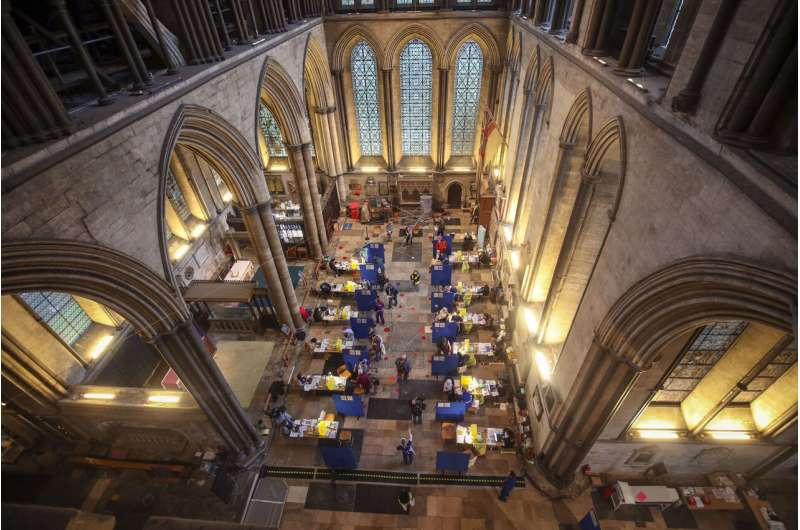
The U.K. government plans to offer a first dose of COVID-19 vaccine to every adult by September as the nation’s health care system battles the worst crisis in its 72-year-history.
Foreign Secretary Dominic Raab said Sunday that the government will soon begin a trial of round the clock injections at some locations as it continues to add more vaccination sites to increase the pace of delivery. The National Health Service opened a mass vaccination center on Saturday at the historic Salisbury Cathedral, where injections were accompanied by organ music.
“Our target is by September to have offered all the adult population a first dose,” he told Sky News. “If we can do it faster than that, great, but that’s the road map.”
Britain has more than 51 million adults in its population of 67.5 million people.
The ambitious vaccination program comes amid crushing pressures on the National Health Service. Already beleaguered hospitals are admitting another COVID-19 patient every 30 seconds, putting the service in its most precarious situation ever, said Simon Stevens, chief executive of NHS England.
“The facts are very clear and I’m not going to sugarcoat them, hospitals are under extreme pressure and staff are under extreme pressure,” he told the BBC. “Since Christmas Day we’ve seen another 15,000 increase in the in-patients in hospitals across England. That’s the equivalent of filling 30 hospitals full of coronavirus patients.”
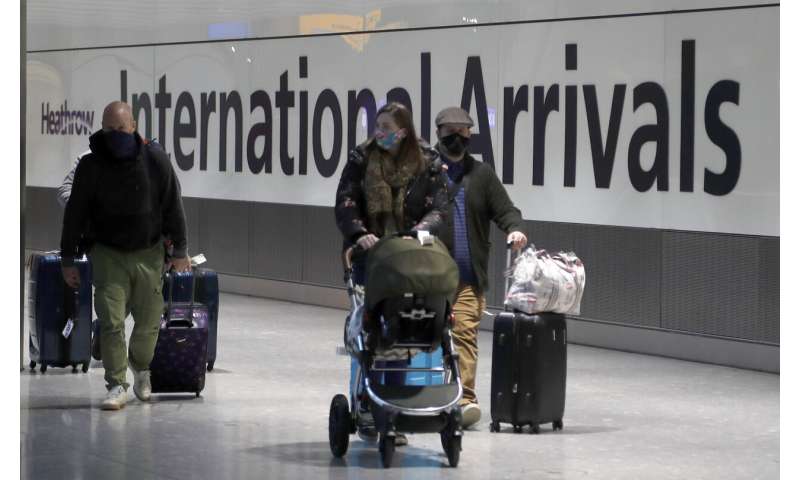
Britain’s health care system is staggering as doctors and nurses battle a more contagious variant of the coronavirus coupled with cold, wet winter weather that drives people inside, where infections spread more easily.
The surge in infections has pushed the number of people hospitalized with COVID-19 to a record 37,475, more than 73% higher than during the first peak of the pandemic in April. Britain has reported 88,747 coronavirus-related deaths, more than any other country in Europe and the fifth-highest number worldwide.
Prime Minister Boris Johnson on Jan. 2 ordered England into its third national lockdown in an effort to slow the spread of the virus and protect the NHS, which Stevens said now has some 50,000 employees off work due to COVID-19 infections and exposure quarantines.
The government says it won’t review the lockdown measures until mid-February, by which time it plans to offer at least one dose of vaccine to everyone over 70, as well as to frontline health care workers and others who are especially vulnerable to COVID-19.
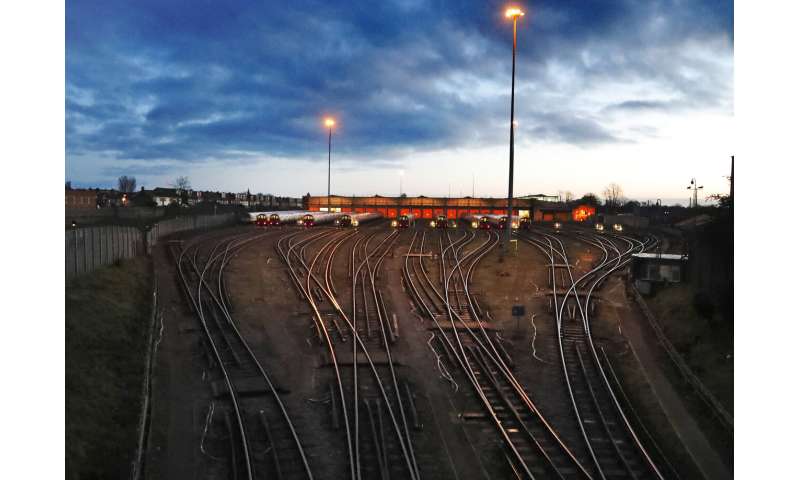 Tube trains are parked at the Boston Manor depot at sunrise in London, Sunday, Jan. 17, 2021, during England’s third national lockdown since the coronavirus outbreak began. Transport for London, TfL, aims to run as close to normal services as possible to enable social distancing when travelling, although people are asked to stay home while the U.K. is under an indefinite national lockdown to curb the spread of the new coronavirus variant. (AP Photo/Frank Augstein)
Tube trains are parked at the Boston Manor depot at sunrise in London, Sunday, Jan. 17, 2021, during England’s third national lockdown since the coronavirus outbreak began. Transport for London, TfL, aims to run as close to normal services as possible to enable social distancing when travelling, although people are asked to stay home while the U.K. is under an indefinite national lockdown to curb the spread of the new coronavirus variant. (AP Photo/Frank Augstein)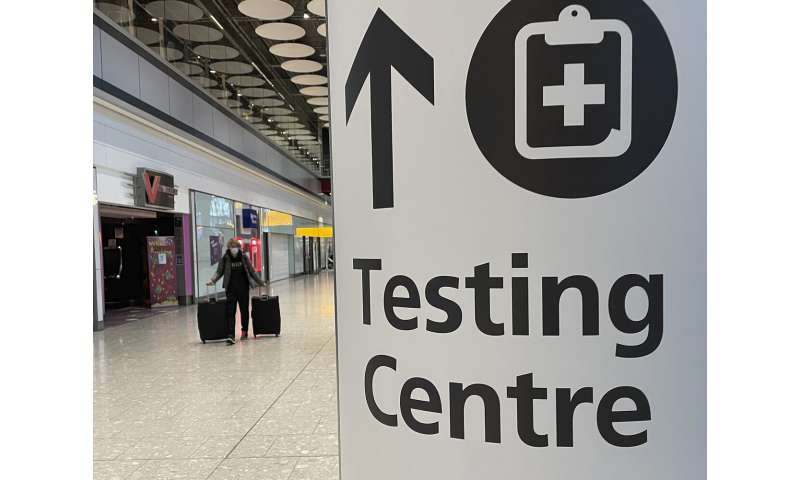 Travellers walk towards the Covid-19 testing centre at Heathrow Airport in London, Sunday, Jan. 17, 2021. The UK will close all travel corridors from Monday morning to protect against the coronavirus with travellers entering the country from overseas are required to have proof of a negative Covid test. (AP Photo/Frank Augstein)
Travellers walk towards the Covid-19 testing centre at Heathrow Airport in London, Sunday, Jan. 17, 2021. The UK will close all travel corridors from Monday morning to protect against the coronavirus with travellers entering the country from overseas are required to have proof of a negative Covid test. (AP Photo/Frank Augstein)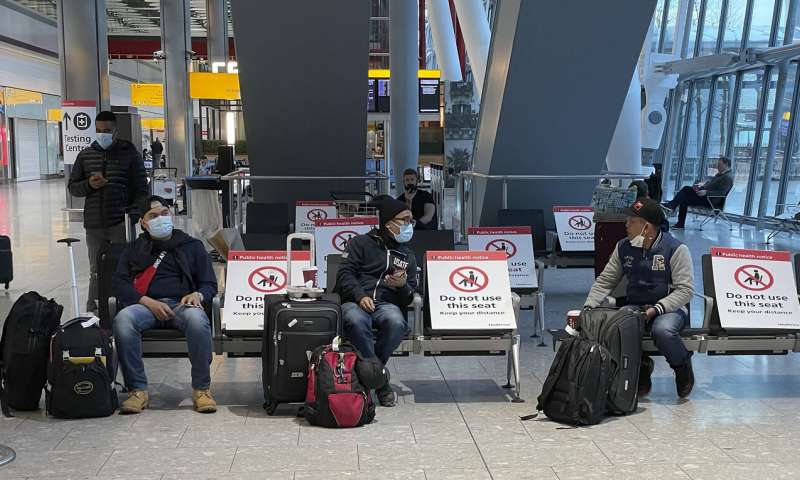 Travellers wait for their Covid-19 test results at Heathrow Airport in London, Sunday, Jan. 17, 2021. The UK will close all travel corridors from Monday morning to protect against the coronavirus, with all travellers to have a negative COVID-19 test to enter the country. (AP Photo/Frank Augstein)
Travellers wait for their Covid-19 test results at Heathrow Airport in London, Sunday, Jan. 17, 2021. The UK will close all travel corridors from Monday morning to protect against the coronavirus, with all travellers to have a negative COVID-19 test to enter the country. (AP Photo/Frank Augstein)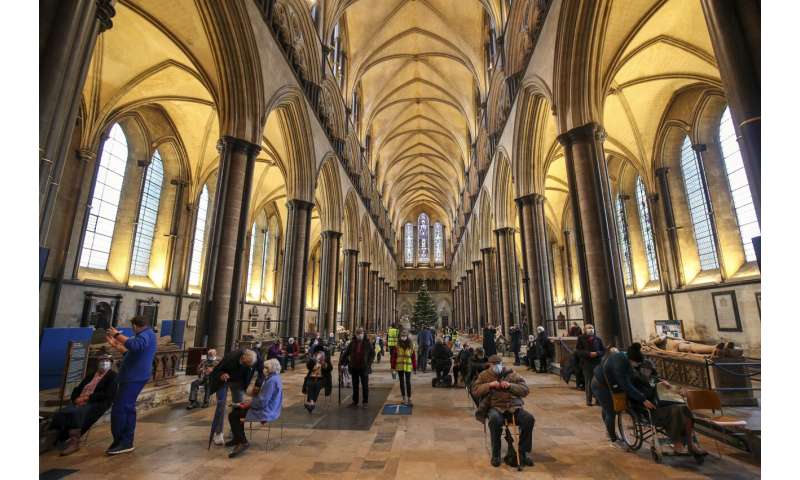 Members of the public receive the Pfizer-BioNTech coronavirus vaccine, at Salisbury Cathedral, in Salisbury, England, Saturday, Jan. 16, 2021. Vaccination centers are being opened in England at some of the country’s great cathedrals. Salisbury Cathedral, which also houses a copy of the Magna Carta, opened its great nave to the public. Others will follow as the rollout continues. Organ music played as the jabs were delivered at Salisbury and requests were even taken. (Steve Parsons/PA via AP)
Members of the public receive the Pfizer-BioNTech coronavirus vaccine, at Salisbury Cathedral, in Salisbury, England, Saturday, Jan. 16, 2021. Vaccination centers are being opened in England at some of the country’s great cathedrals. Salisbury Cathedral, which also houses a copy of the Magna Carta, opened its great nave to the public. Others will follow as the rollout continues. Organ music played as the jabs were delivered at Salisbury and requests were even taken. (Steve Parsons/PA via AP)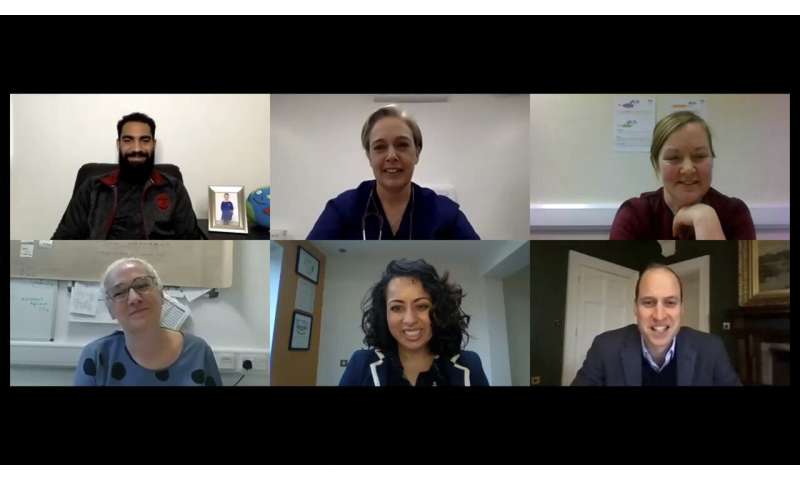 In this photo issued by Kensington Palace, Britain’s Prince William, bottom right talks on a virtual call with NHS staff and volunteers , from left, top row Saints Foundation volunteer and flow manager at Solent NHS Trust and University Hospital Southampton Jake Plummer, GP at Rysseldene Surgery in Colwyn Bay Dr Helen Alefounder, nurse and clinical lead on Covid-19 vaccinations in care homes in Ayrshire and Arran Dalene Steele, from left bottom row, pharmacist at Altnagelvin Hospital in Londonderry Bronagh Hegarty and Medical Director of Primary Care for NHS England Dr Nikki Kanani. Prince William is encouraging everyone in Britain to follow the example of Queen Elizabeth II, his grandmother, in being inoculated against COVID-19 as authorities battle unsubstantiated fears about vaccine safety. The second in line to the throne spoke about the queen and her spouse, Prince Philip, during a video call with National Health Service staff and volunteers that was released late Saturday, Jan. 16, 2021. (Kensington Palace/via AP)
In this photo issued by Kensington Palace, Britain’s Prince William, bottom right talks on a virtual call with NHS staff and volunteers , from left, top row Saints Foundation volunteer and flow manager at Solent NHS Trust and University Hospital Southampton Jake Plummer, GP at Rysseldene Surgery in Colwyn Bay Dr Helen Alefounder, nurse and clinical lead on Covid-19 vaccinations in care homes in Ayrshire and Arran Dalene Steele, from left bottom row, pharmacist at Altnagelvin Hospital in Londonderry Bronagh Hegarty and Medical Director of Primary Care for NHS England Dr Nikki Kanani. Prince William is encouraging everyone in Britain to follow the example of Queen Elizabeth II, his grandmother, in being inoculated against COVID-19 as authorities battle unsubstantiated fears about vaccine safety. The second in line to the throne spoke about the queen and her spouse, Prince Philip, during a video call with National Health Service staff and volunteers that was released late Saturday, Jan. 16, 2021. (Kensington Palace/via AP) Tube trains are parked at the Boston Manor depot at sunrise in London, Sunday, Jan. 17, 2021, during England’s third national lockdown since the coronavirus outbreak began. Transport for London, TfL, aims to run as close to normal services as possible to enable social distancing when travelling, although people are asked to stay home while the U.K. is under an indefinite national lockdown to curb the spread of the new coronavirus variant. (AP Photo/Frank Augstein)
Tube trains are parked at the Boston Manor depot at sunrise in London, Sunday, Jan. 17, 2021, during England’s third national lockdown since the coronavirus outbreak began. Transport for London, TfL, aims to run as close to normal services as possible to enable social distancing when travelling, although people are asked to stay home while the U.K. is under an indefinite national lockdown to curb the spread of the new coronavirus variant. (AP Photo/Frank Augstein) Travellers walk towards the Covid-19 testing centre at Heathrow Airport in London, Sunday, Jan. 17, 2021. The UK will close all travel corridors from Monday morning to protect against the coronavirus with travellers entering the country from overseas are required to have proof of a negative Covid test. (AP Photo/Frank Augstein)
Travellers walk towards the Covid-19 testing centre at Heathrow Airport in London, Sunday, Jan. 17, 2021. The UK will close all travel corridors from Monday morning to protect against the coronavirus with travellers entering the country from overseas are required to have proof of a negative Covid test. (AP Photo/Frank Augstein)
Once that goal has been reached, the U.K. will offer the vaccine to everyone over 50 before finally moving on to everyone over 18.
Unlike other nations, Britain has chosen to stretch out the time between vaccine doses from 21 days to up to 12 weeks—a decision that means more people will get at least one dose more quickly.
Britain has approved three vaccines—ones by Pfizer-BioNTech, Oxford-AstraZeneca and Moderna. The first two are already being used, while the Moderna doses are not expected until spring.
Meanwhile, vaccination centers are being opened in England at some of the country’s great cathedrals. Salisbury Cathedral, which also houses a copy of the Magna Carta, opened its great nave to the public. Others will follow as the rollout continues.
Organ music played as the jabs were delivered at Salisbury. Requests were taken.
“I doubt that anyone is having a jab in surroundings that are more beautiful than this, so I hope it will ease people as they come into the building,” said the Very Rev. Nicholas Papadopulos, Dean of Salisbury.
Danica Kirka

